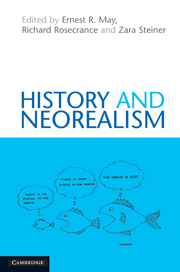Book contents
- Frontmatter
- Contents
- List of tables
- Notes on contributors
- Acknowledgments
- 1 Theory and international history
- 2 Transformations in power
- 3 Domestically driven deviations: internal regimes, leaders, and realism's power line
- 4 How international institutions affect outcomes
- 5 Not even for the seventeenth and eighteenth centuries: power and order in the early modern era
- 6 Austria-Hungary and the coming of the First World War
- 7 British decisions for peace and war 1938–1939: the rise and fall of realism
- 8 Realism and risk in 1938: German foreign policy and the Munich Crisis
- 9 Domestic politics, interservice impasse, and Japan's decisions for war
- 10 Military audacity: Mao Zedong, Liu Shaoqi, and China's adventure in Korea
- 11 The United States' underuse of military power
- 12 The overuse of American power
- 13 Redrawing the Soviet power line: Gorbachev and the end of the Cold War
- 14 Shared sovereignty in the European Union: Germany's economic governance
- 15 John Mearsheimer's “elementary geometry of power”: Euclidean moment or an intellectual blind alley?
- 16 History and neorealism reconsidered
- Index
- References
15 - John Mearsheimer's “elementary geometry of power”: Euclidean moment or an intellectual blind alley?
Published online by Cambridge University Press: 05 June 2012
- Frontmatter
- Contents
- List of tables
- Notes on contributors
- Acknowledgments
- 1 Theory and international history
- 2 Transformations in power
- 3 Domestically driven deviations: internal regimes, leaders, and realism's power line
- 4 How international institutions affect outcomes
- 5 Not even for the seventeenth and eighteenth centuries: power and order in the early modern era
- 6 Austria-Hungary and the coming of the First World War
- 7 British decisions for peace and war 1938–1939: the rise and fall of realism
- 8 Realism and risk in 1938: German foreign policy and the Munich Crisis
- 9 Domestic politics, interservice impasse, and Japan's decisions for war
- 10 Military audacity: Mao Zedong, Liu Shaoqi, and China's adventure in Korea
- 11 The United States' underuse of military power
- 12 The overuse of American power
- 13 Redrawing the Soviet power line: Gorbachev and the end of the Cold War
- 14 Shared sovereignty in the European Union: Germany's economic governance
- 15 John Mearsheimer's “elementary geometry of power”: Euclidean moment or an intellectual blind alley?
- 16 History and neorealism reconsidered
- Index
- References
Summary
“There will always be some anomalies.”
John Mearsheimer of Chicago, quondam soldier, US Air Force officer, and unmasker of the brilliant but flawed military theorist Sir Basil Liddell Hart – “the most famous and widely advanced military historian and theorist in the world” – is himself an enfant terrible. “I don't like authority,” Mearsheimer confesses. An odd remark is this to come from a West Point graduate: clearly no facile mind; indeed, an engaging intellectual, a gifted teacher and debater, the genial host, Mearsheimer is also the compulsive contrarian, courting controversy among liberals while complaining that the doors of Harvard are closed to him because of their intolerance. The latest example is an onslaught against the Israeli lobby in US foreign policy, which cuts directly across Mearsheimer's extensively articulated notion that domestic politics play a subordinate if not insubstantial role determining international relations.
Mearsheimer made a name for himself after the end of the Cold War with a merciless onslaught against “The False Promise of International Institutions.” Following a decade of disillusion after heightened expectations the United Nations was in no condition to meet, the polemic has withstood well the test of time and a barrage of attacks from fervent liberal internationalists. A magnum opus, The Tragedy of Great Power Politics, takes the assault to higher ground and outlines an entire model of international relations. Here Mearsheimer asserts that “[t]he main causes of war are located in the architecture of the international system.”
- Type
- Chapter
- Information
- History and Neorealism , pp. 322 - 340Publisher: Cambridge University PressPrint publication year: 2010
References
- 29
- Cited by



